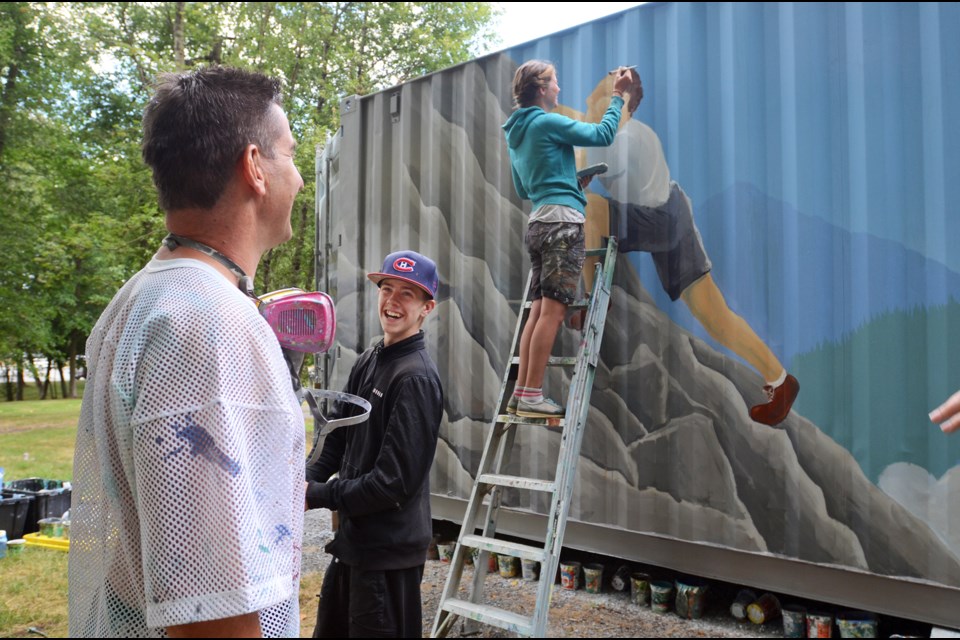Getting kicked out of Burnaby South Secondary might have been the best thing that could have happened to Sasha Ruban this year.
The Grade 10 student says he’d made some bad decisions that led him to skip school and get the boot this spring.
He was slated to start anew at the district’s storefront program at the Canada Way Learning Centre, but a teacher at Burnaby South recommended Take a Hike, a new adventure-based alternate education program for at-risk high school students.
For Ruban, an active youth who took kickboxing for eight years and played on Burnaby South’s rugby team, the hands-on program was a perfect fit.
“With Take a Hike, you don’t do anything out of a textbook,” he said. “Like with physics, I’d do that in the middle of a kayaking trip on a beach, drawing charts in the sand instead of on paper and reading a textbook. It’s a lot more interesting, especially if you have an instant example of how positive vectors work or an example of how negative and positive acceleration works.”
The program, which features multi-day wilderness expeditions and activities like hiking, kayaking, canoeing and snowshoeing, is a partnership between the school district and the Take a Hike Youth at Risk Foundation, a non-profit that also works in Vancouver and the West Kootenays.
Under the partnership, Take a Hike funds a full-time therapist (Matt Schipper) and the adventure-based learning activities, while the district provides a classroom space, a teacher (Dallas Plensky) and a family youth worker who is also an adventure-based learning specialist (Miles Minichiello).
Teacher Dallas Plensky comes uniquely equipped for the job.
A former wildlife biologist, she has a passion for the outdoors and has spent her fair share of time in the bush – like hiking around the mountains above the Okanagan Valley, studying big horned sheep for her master’s degree.
She said her first year in the Take a Hike program has really driven home the importance of small class sizes and extra supports for at-risk students.
“I’ve learned that, when you can spend real, quality time in a relevant way with students who have challenges, you can develop a really close relationship and help that student, help them from within,” she said. “Every single student in our program right now, this is their best academic year that they’ve ever had. We had students who were failing almost every single course, and they’re passing. We have a kid who was on the honour roll this year. We have students who didn’t attend at all last year at their school, missed 200 classes, and now they’re attending every day.”
One key support for kids in the program is therapist Matt Schipper.
Having access to his counsel at the Canada Way Education Centre and during multi-day camping trips, has made a big difference to Ruban.
“It feels like it takes a big weight off your chest,” Ruban said. “If you ever have something you need to get out, you can always come here. I’ve done that before and I felt much better and I’ve become more productive every time I do it.”
Ruban was only in the Take a Hike program for about a month-and-a-half this year, but already he’s looking forward to next school year.
“With other schools I’d be looking more towards summer and just finishing school,” he said, “where here, I’m kind of equally looking toward summer but also looking toward adventures we’re going to go on next year.”
The program currently has a 20-student capacity.
During its first year this year, its population fluctuated between 10 to 15 students, but director of instruction Ron Hall isn’t panicking.
“Everyone’s really excited about the program, and we know it will grow,” he said.
“Last spring, when we were talking to families and students about coming to the program, we didn’t really have anything to show them other than a history and a philosophy. Kids and families took a gamble with us that we were going to provide something special, and we’re excited that we were able to do that. Moving forward, it’s far easier to sell something that actually exists.”
For next year, the program could use more community support, according to Plensky, starting with volunteer opportunities.
Students in the program complete a minimum 60 hours of community service every year.
This year, for example, they helped remove invasive plant species in Belcarra.
The program could also use donations of all kinds of outdoor gear, like tents and kayaks, so it doesn’t have to borrow or rent the equipment in the future.
To help out, contact Take a Hike Foundation program director Jaydeen Williams at jaydeen@takeahikefound
ation.org or 604-630-5819.
Parents or students interested in the program can contact Sue Dorey over the summer at 604-296-6900 or [email protected].



